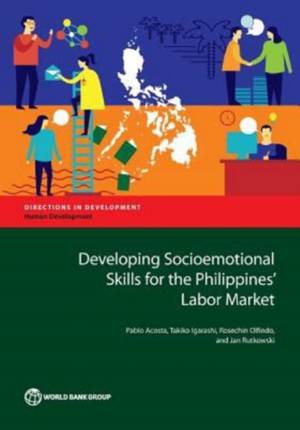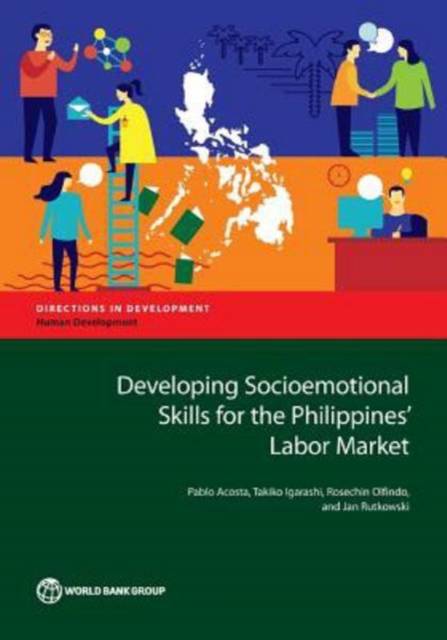
- Retrait gratuit dans votre magasin Club
- 7.000.000 titres dans notre catalogue
- Payer en toute sécurité
- Toujours un magasin près de chez vous
- Retrait gratuit dans votre magasin Club
- 7.000.0000 titres dans notre catalogue
- Payer en toute sécurité
- Toujours un magasin près de chez vous
Developing Socioemotional Skills for the Philippines' Labor Market
Pablo Acosta, Takiko Igarashi, Rosechin OlfindoDescription
While the Philippines has achieved remarkable progress in raising the education level of its labor force, the standard proxy for educational attainment--years of formal schooling--is increasingly inadequate as a measure of workforce skills. About one-third of employers report being unable to fill vacancies due to lack of applicants with the requisite skills. Most of these "missing skills" are socioemotional skills," also known as "non-cognitive skills," "soft skills" or "behavioral skills." Emerging international evidence suggests that socioemotional skills are increasingly crucial to the types of jobs being created by the global economy. The following study presents new evidence from employer and household surveys on the role of socioemotional skills in the Philippine labor market. The analysis reveals that: - Two-thirds of employers report difficulty in finding workers with adequate work ethics or appropriate interpersonal and communications skills. Firm-based training increasingly focuses on socioemotional skills. - The more educated and employed workers tend to score higher on measures of grit, decision-making, agreeableness, and extroversion. - Socioemotional skills are associated with an increase in average daily earnings, in particular for women, young workers, less-educated workers, and those employed in the service sector. - Higher levels of socioemotional skills are also correlated with a greater probability of being employed, having completed secondary education, and pursuing tertiary education. Studies suggest that primary school is the optimal age for shaping socioemotional skills, but the Philippines' elementary education curriculum devotes limited resources to their development. Schools continue to be judged solely by students' performance in cognitive achievement tests, but not on soft-skills competencies, and teachers are not appropriately trained to foster the development of them. Finally, interventions targeting workers entering the labor force can also effectively bolster their socioemotional skills, complementing effects to improve labor-market information and vocational counseling.
Spécifications
Parties prenantes
- Auteur(s) :
- Editeur:
Contenu
- Nombre de pages :
- 112
- Langue:
- Anglais
- Collection :
Caractéristiques
- EAN:
- 9781464811913
- Date de parution :
- 13-11-17
- Format:
- Livre broché
- Format numérique:
- Trade paperback (VS)
- Dimensions :
- 178 mm x 254 mm
- Poids :
- 213 g

Les avis
Nous publions uniquement les avis qui respectent les conditions requises. Consultez nos conditions pour les avis.






